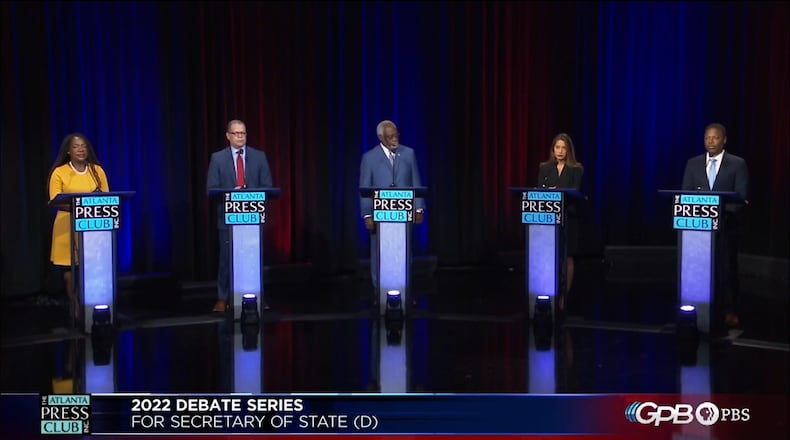All five Democratic candidates running for secretary of state said Monday that they wouldn’t defend Georgia’s voting law against multiple pending lawsuits if they win election.
The Democrats staked out their opposition to the voting law during a debate in which the candidates contrasted themselves more with Republicans than each other. The law limited ballot drop boxes, imposed additional ID requirements, tightened absentee voting rules and allowed state takeovers of struggling county election offices.
With little disagreement, the candidates pitched themselves as defenders of democracy and voting rights at the debate sponsored by the Atlanta Press Club and aired by Georgia Public Broadcasting.
“I’ve been at the forefront of battling against voter suppression bills,” said state Rep. Bee Nguyen, a Democrat from Atlanta. “This is about understanding how to maneuver the Legislature under a polarizing and toxic environment, and I will continue as secretary of state to work within that legislative body to ensure that we are fighting for fair and free elections.”
John Eaves, the former chairman of the Fulton County Commission, said the voting law has a disproportionate impact on Black voters, who overwhelmingly support Democratic candidates and are more likely to lack the kind of ID now required for absentee voting.
“This law is specifically designed to minimize Black political involvement and engagement and representation across the state of Georgia,” Eaves said. “I would not defend a law that is inherently against my ancestors, myself and my family.”
Ten lawsuits are now pending in federal court against the voting law, Senate Bill 202, opposing a wide variety of provisions in the 98-page legislation.
The latest court challenge was filed Monday in opposition to rules and laws that require a “pen and ink” signature on absentee ballot applications. In 2020, voters were able to request absentee ballots online.
Dee Dawkins-Haigler, a former state representative from DeKalb County, said the law tightens voting rules at the expense of voting access, resulting in new barriers for voters.
“The secretary of state should make it easy and accessible for everyone to cast their vote. Yet, what they’ve done here in Georgia is unconscionable,” Dawkins-Haigler said.
The secretary of state should work to make it easier for all eligible voters to cast a ballot, especially Black voters who feel targeted by Georgia’s voting laws, said Michael Owens, former chairman of the Cobb County Democratic Party.
“One of the things that I can do as secretary of state is to ensure that without a doubt that we are ensuring every single voter has access to a ballot,” Owens said.
Floyd Griffin, a former mayor of Milledgeville and state senator, said he would stand on principles of empowering voters rather than imposing voting restrictions.
“I’m not going to do anything that I do not believe in,” Griffin said. “Republicans can see what happened to the extent of getting the president, the vice president and our two senators elected, and they want to turn that around.”
Three weeks of early voting began Monday in advance of the May 24 primary. If none of the candidates wins more than 50% of the votes cast, the top two finishers will meet in a runoff June 21.
About the Author
Keep Reading
The Latest
Featured




